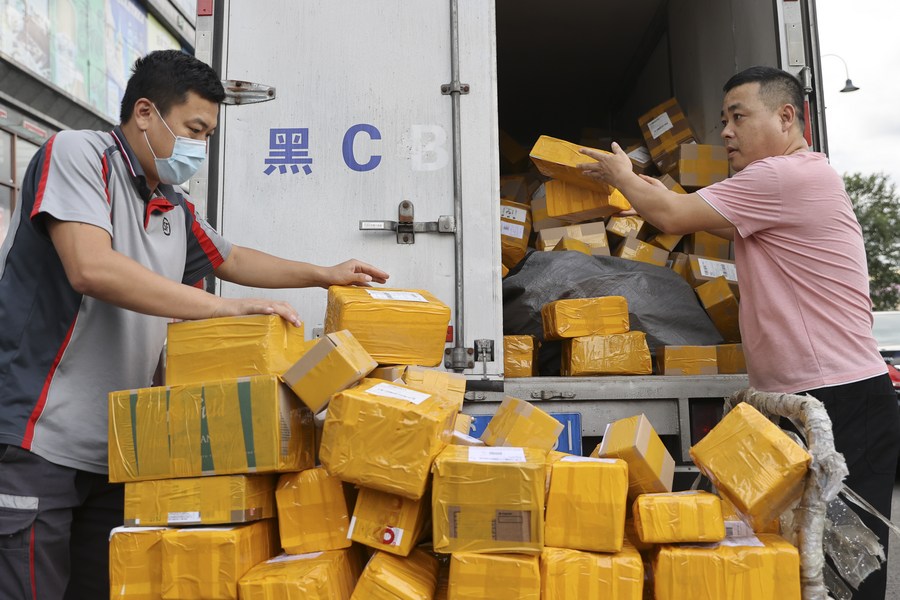
Deliverymen arrange packages of goods from Russia in the Suifenhe sub-area of the Heilongjiang pilot free trade zone (FTZ) in northeast China's Heilongjiang Province, on Sept. 9, 2020. (Xinhua/Zhang Tao)
HARBIN, Sept. 8 (Xinhua) -- At an e-commerce livestreaming base in a border city in northeast China's Heilongjiang Province, anchorwoman Fang Ziyue was busy introducing commodities in front of a camera.
"The Russia-made chocolate I'm holding tastes deliciously sweet," said Fang, standing in front of a shelf packed with different kinds of goods imported from Russia.
The cross-border e-commerce livestreaming base is in the Heihe Area of China (Heilongjiang) Pilot Free Trade Zone in the city of Heihe. Established last year, it now has 35 studios for livestreaming shows.
From January to June, the cross-border e-commerce trade volume of the Heihe Area of the free trade zone reached 640 million yuan (about 99.14 million U.S. dollars), up 17 percent year on year.
As the COVID-19 pandemic has greatly affected the personnel exit and entry on the China-Russia border, the cross-border service trade between the two countries has been going digital online.
In Suifenhe People's Hospital in the border city of Suifenhe, Zhao Jing, a doctor in traditional Chinese medicine (TCM), always carries her mobile to answer questions from her Russian patients at any time.
The hospital established a national base for TCM service exports in 2013, which promotes medical tourism, including health checkup management and the TCM service trade.

A staff member demonstrates the process of making Traditional Chinese Medicine (TCM) at the Health Services exhibition area during the 2021 China International Fair for Trade in Services (CIFTIS) held in Beijing, capital of China, Sept. 3, 2021. (Xinhua/Lu Peng)
Zhao, also deputy director of the base, said it provided remote consultation for Russian patients through online Q&As and video links following the pandemic.
Via a social networking app, Vyacheslav Kurmanov asked Zhao about the prescriptions of TCM-made pills and their effect.
Kurmanov visited the hospital every year with his family for TCM care and therapy until the spread of the novel coronavirus.
He said he is very interested in TCM, and the online consultation is convenient for them to ask for professional help.
According to the hospital, the base has served more than 1,500 Russian patients online since the pandemic.
The pandemic has provided opportunities for Jin Peng, 29, who has started an online education company in the provincial capital of Harbin. The company hires foreign instructors to teach Russian online and offers audio, video, and text documents via internet platforms.
The company also serves as an agent serving Chinese students who want to study in Russia. Via the company, more than 200 students have registered at institutions in Russia to learn online since 2020.
"During the pandemic, we maintained business contacts with several Russian universities through various online methods to discuss details about students studying abroad. The internet has made the contacts convenient," said Jin.
Song Kui, an expert on the China-Russia regional economy, said new technologies such as "internet+," big data, and 5G promoted the province's service trade development with Russia.
"Digital technology will help make the service trade with Russia more convenient and efficient," he said.




 A single purchase
A single purchase









